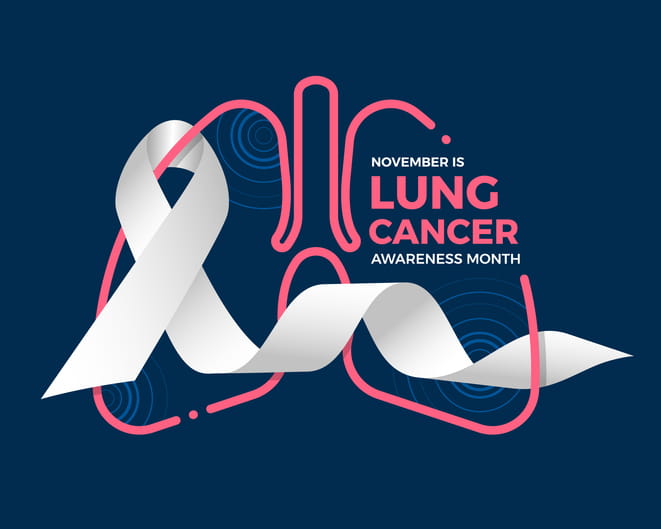Lung Cancer Awareness Month
Lung cancer is the third-most common type of cancer. Experts estimate over 226,000 people in the U.S. will be diagnosed with lung cancer in 2025, and almost 125,000 people with the disease will die.
November is Lung Cancer Awareness Month. Medical experts use Lung Cancer Awareness Month to increase awareness about the disease, risk factors for lung cancer, and how lung cancer screenings can save lives.
Raising awareness in Las Vegas helps ensure residents are diagnosed at the earliest signs of lung cancer. Early intervention helps save lives and control demand for treatment, allowing medical facilities to provide all patients with the care they need.
Knowing the risk factors ensures those at risk schedule lung cancer screenings so they can receive an early diagnosis if they develop lung cancer. In addition to increasing survival rates, early diagnosis can significantly decrease the treatment costs. Consequently, those diagnosed early can manage the medical costs and return to the workforce sooner, ensuring their personal stability and promoting economic stability in their community.
Schedule your scan 702-534-7900.
Understanding Lung Cancer
The most common types of lung cancer are:
- Non-small cell lung cancer
- Small-cell lung cancer
Both types of lung cancer involve the growth of abnormal cells. Up to 85% of lung cancer cases involve non-small cell lung cancer.
A person has lung cancer if the abnormal cells in their lungs form a tumor. Reasons for abnormal cell growth include the following:
- Carcinogens: Exposure to toxins, such as asbestos, pollution, some chemicals, and tobacco smoke, can cause lung cancer.
- Genetics: People can inherit genetic conditions that cause gene mutations, leading to abnormal cell growth.
Lung cancer can damage or destroy healthy lung tissue. Individuals with lung cancer may have difficulty breathing and expelling carbon dioxide if tumors obstruct their airways.
Following up on any early signs of lung cancer ensures early diagnosis. Less than 10% of those diagnosed after lung cancer has spread to other organs survive for five years after diagnosis. The five-year survival rate rises to 61% for those diagnosed with stage 1 lung cancer.
Common Risk Factors
Common lung cancer risk factors include the following:
- Exposure to asbestos
- Exposure to diesel exhaust
- Exposure to pollution
- Exposure to radon
- Exposure to silica
- Family history of lung cancer
- Health conditions such as bronchitis and emphysema
- Genetic mutations
- Radiation therapy
- Second-hand smoke
- Tobacco smoke
Your risk of lung cancer also increases as you age.
You’re at greater risk of developing lung cancer if you smoke, have had radiation therapy, or have a family history of the disease. You also have an increased risk if you have multiple risk factors.
If you have a high risk of developing lung cancer, you should schedule a preventative screening, even if you do not have any symptoms. Diagnosing lung cancer in the earliest stages significantly increases your chances of survival.
Early Signs and Symptoms
In addition to difficulty breathing, lung cancer symptoms include:
- Chest pain
- Coughing
- Shortness of breath
Without treatment, lung cancer symptoms can expand to include the following:
- Coughing up blood
- Jaundice
- Difficulty swallowing
- Dizziness
- Fatigue
- Headaches
- Respiratory infections
- Swollen face or neck
- Unexplained weight loss
Waiting to schedule a screening after obvious symptoms appear means your lung cancer has progressed. There’s a greater risk that the cancer will have spread to other organs, which decreases the survival rate. Scheduling a screening before obvious symptoms emerge increases the likelihood of survival.
The Importance of Lung Cancer Screenings
Lung CT scans provide a clear image of what’s happening inside your lungs. These scans can reveal tumors as small as five millimeters. Our frequently asked questions note that non-invasive scans take approximately 15 minutes and provide detailed information about your lung health. A scan can ensure you receive the earliest diagnosis possible, giving you the best chance of receiving affordable, effective treatment.
At best, the lung CT scan will restore your peace of mind and confirm you’re healthy. And if the scan does reveal you have lung cancer, you can get swift treatment, decreasing your treatment costs, and increasing your chances of a full recovery.
Preventive Diagnostic Center: Your Partner in Early Detection
Preventative Diagnostic Center performs scans that produce detailed images of your lungs. These non-invasive lung scans are quick. Our team works to ensure accurate results so you receive the information you need to seek treatment, if necessary. You can expect a detailed report within 10 days of your scan.
You can contact us to schedule a lung CT scan during Lung Cancer Awareness Month. You do not need a doctor’s referral to book your scan.
Get Detailed Information About Your Lung Health
Lung Cancer Awareness Month is the ideal time to take proactive steps for your lung health, and schedule a lung CT scan.
Reviewing the risk factors and monitoring yourself for symptoms can help you identify reasons you may be at risk of developing cancer. You can schedule a lung CT scan at Preventative Diagnostic Center today to get prompt, detailed information about your lung health, ensure you catch any signs of lung cancer in its earliest stages, and receive prompt treatment, if necessary.

